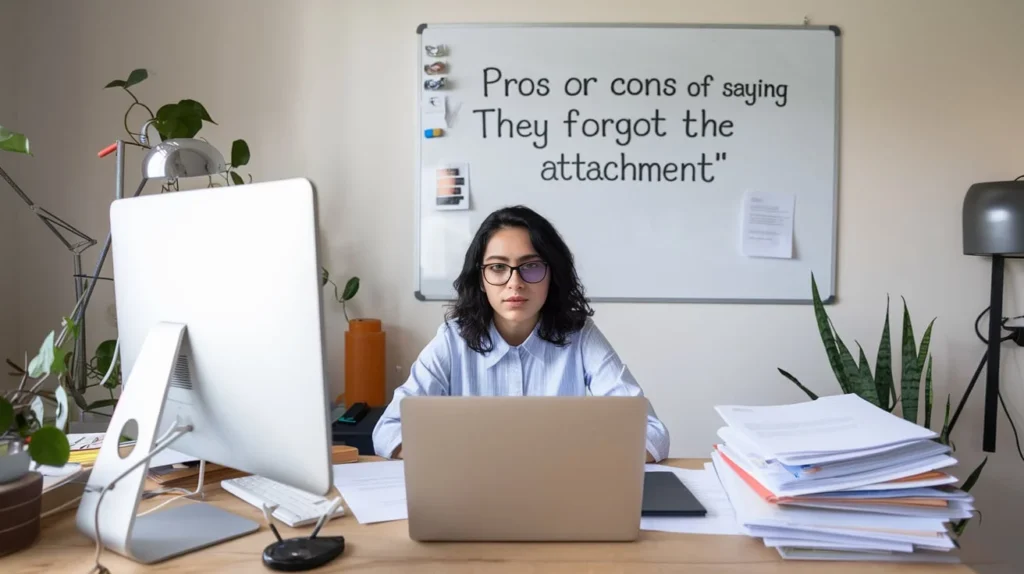In our daily communications, especially through emails, it’s often easy to overlook something like an attachment. However, it’s important to find the right words to express this observation—words that maintain a respectful tone while still addressing the mistake.
Sometimes, the way we phrase things can make all the difference in how our message is received. This article provides 20 thoughtful and empathetic alternatives to saying “They forgot the attachment,” helping you communicate with warmth, care, and clarity.
What Does “They Forgot the Attachment” Mean?
Before diving into alternatives, it’s helpful to understand what “They forgot the attachment” means. This phrase usually refers to a situation in which someone forgets to include a file or document with an email they’ve sent. It’s a common mistake and often requires a polite and friendly reminder to avoid any miscommunication.
Is It Professional/Polite to Say “They Forgot the Attachment”?
While the phrase “They forgot the attachment” is factual, it can come off as slightly blunt or direct. Depending on your relationship with the recipient, it’s essential to consider the tone you wish to convey. The key is to remain polite and considerate when reminding someone of an overlooked attachment, as it shows empathy and understanding for simple human mistakes.
Pros or Cons of Saying “They Forgot the Attachment”

Pros:
- Direct and clear.
- Suitable for a quick reminder.
- Straightforward without ambiguity.
Cons:
- Can sound curt, especially in formal communication.
- Might come across as accusatory if not phrased properly.
Synonyms For “They Forgot the Attachment”
- I think the attachment might have been missed
- It looks like the attachment wasn’t included
- It seems the attachment got overlooked
- I didn’t see the attachment in your email
- Could you resend the attachment?
- It seems like the attachment might be missing
- I wasn’t able to find the attachment
- I think the attachment didn’t come through
- Could you double-check the attachment?
- It appears the attachment was omitted
- Looks like the attachment didn’t make it
- I think the attachment was missed
- I don’t see the attachment in the email
- There was no attachment in your email
- It seems the attachment is missing
- I think you might have forgotten the attachment
- Would you mind sending the attachment?
- Could you kindly include the attachment?
- The attachment might have been left off
1. “I Think the Attachment Might Have Been Missed”
Sometimes, offering a gentle nudge is all it takes. This alternative is polite and leaves room for the possibility of a simple oversight.
Scenario Example :
“Hi [Name],
I noticed that the attachment might have been missed in your previous email. Could you kindly resend it when you have a moment? Thank you!”
Best Use:
This phrase works well when you want to avoid sounding critical and prefer to remain considerate and helpful.
Additional Note:
This approach softens the reminder and encourages cooperation without highlighting the mistake.
2. “It Looks Like the Attachment Wasn’t Included”
Here’s a simple, clear way to bring up the missing attachment without making it feel like an accusation.
Scenario Example :
“Hello [Name],
It looks like the attachment wasn’t included in your last email. Would you mind sending it over when you get a chance? Thanks in advance!”
Best Use:
This phrasing is ideal when you want to bring attention to the error in a gentle manner.
Additional Note:
This approach is polite and doesn’t make the other person feel as though they’ve made a major mistake.
3. “It Seems the Attachment Got Overlooked”
This option shows empathy and suggests that the oversight was unintentional.
Scenario Example :
“Hi [Name],
It seems the attachment got overlooked in the previous email. No worries—whenever you can send it through, that would be great!”
Best Use:
This is perfect for a more informal, friendly tone where you’re providing the benefit of the doubt.
Additional Note:
A reassuring phrase, it creates a sense of understanding, which is great for positive workplace dynamics.
4. “I Didn’t See the Attachment in Your Email”
This phrase is more neutral, simply noting the absence of the attachment without suggesting blame.
Scenario Example :
“Hello [Name],
I didn’t see the attachment in your email. Could you kindly check and send it again when possible?”
Best Use:
This phrase works well when you’re writing to someone you don’t know well, keeping things professional and to the point.
Additional Note:
Though polite, this could be considered slightly more direct, so it’s best used in formal communication.
5. “Could You Resend the Attachment?”
A short and polite way to request the attachment again, implying no fault on the sender’s part.
Scenario Example :
“Hi [Name],
Could you resend the attachment from your last email? I may have missed it. Thanks for your help!”
Best Use:
This is a great option for a simple, straightforward request that doesn’t sound overly critical.
Additional Note:
It’s a useful phrase for when you want to keep the message light and focus solely on the action.
6. “It Seems Like the Attachment Might Be Missing”
This phrase uses “seems like,” which provides a softer touch and implies a possibility rather than certainty.
Scenario Example :
“Dear [Name],
It seems like the attachment might be missing from the email you sent. Could you double-check and forward it when you have a chance?”
Best Use:
This is great for maintaining a respectful and polite tone in more formal or professional communication.
Additional Note:
It implies that the error is not serious and avoids blaming anyone directly.
7. “I Wasn’t Able to Find the Attachment”
A soft, non-accusatory way of saying the attachment wasn’t included, placing no fault on the sender.
Scenario Example :
“Hello [Name],
I wasn’t able to find the attachment you mentioned. Would you mind sending it again? Thank you!”
Best Use:
Perfect for when you want to keep the tone respectful and free from any implication of blame.
Additional Note:
This phrasing is versatile and can be used in both informal and formal contexts.
8. “I Think the Attachment Might Have Been Left Out”
This softens the reminder by suggesting the possibility of an unintentional oversight.
Scenario Example :
“Hi [Name],
I think the attachment might have been left out of your last email. When you get a chance, could you kindly resend it?”
Best Use:
Ideal when communicating with colleagues or clients in a professional environment.
Additional Note:
This keeps the tone friendly and understanding, without sounding too blunt.
9. “Could You Double-Check the Attachment?”
A polite and slightly more formal way to ask the sender to review their email.
Scenario Example :
“Dear [Name],
Could you double-check the attachment in your last email? I don’t seem to have received it. Thanks so much!”
Best Use:
Great for situations where you want to express your need for the attachment without appearing too casual.
Additional Note:
A nice balance between formality and friendliness, this works well in both professional and personal settings.
10. “I Think the Attachment Didn’t Come Through”
This phrase is another way of expressing that the attachment was likely missed, while remaining polite.
Scenario Example :
“Hi [Name],
I think the attachment didn’t come through on your last email. Would you mind checking again? Appreciate your help!”
Best Use:
A good choice for email communication that needs to stay light, friendly, and clear.
Additional Note:
This is less direct than other phrases, showing an understanding that the error was likely unintentional.
11. “It Appears the Attachment Was Omitted”
This slightly more formal alternative is appropriate in professional settings, especially when you want to stay courteous.
Scenario Example :
“Hello [Name],
It appears the attachment was omitted from your last email. Could you please send it when you have a moment? Thank you!”
Best Use:
Ideal when you’re communicating with supervisors or clients and want to maintain a formal tone.
Additional Note:
This is a formal, yet gentle way to point out a missing attachment.
12. “Looks Like the Attachment Didn’t Make It”
A friendly and informal alternative that still addresses the mistake without sounding too harsh.
Scenario Example :
“Hi [Name],
Looks like the attachment didn’t make it through on your last email. Can you resend it when you get a chance?”
Best Use:
Perfect for a more relaxed communication style, especially with colleagues you have a good rapport with.
Additional Note:
This phrase is conversational and avoids sounding overly formal, making it ideal for internal communication.
13. “I Think the Attachment Was Missed”
This phrasing implies that the omission was accidental, keeping things light.
Scenario Example :
“Dear [Name],
I think the attachment was missed when you sent your last email. Could you kindly forward it again when possible?”
Best Use:
Useful for situations where you want to avoid sounding accusatory and keep the tone professional and kind.
Additional Note:
It’s polite and offers a helpful suggestion without dwelling on the mistake.
14. “I Don’t See the Attachment in the Email”
A neutral, straightforward phrase that brings attention to the missing file.
Scenario Example :
“Hello [Name],
I don’t see the attachment in the email you sent earlier. Would you mind resending it when you have a moment?”
Best Use:
Great for when you want to keep the message simple and focused on the action needed.
Additional Note:
Though slightly more direct, it remains polite and respectful.
15. “There Was No Attachment in Your Email”
A more factual approach that simply states the absence of the attachment.
Scenario Example :
“Hi [Name],
There was no attachment in your email. Could you please check and resend it? Thanks for your help!”
Best Use:
Works well for more direct communication, especially when you need the attachment as soon as possible.
Additional Note:
While polite, this phrasing is not overly casual or informal, so it’s best used for professional correspondence.
16. “It Seems the Attachment Is Missing”
A soft reminder that implies no fault on the sender’s part, just a simple oversight.
Scenario Example :
“Dear [Name],
It seems the attachment is missing from your previous email. Could you kindly resend it when possible? Thank you!”
Best Use:
Ideal for formal communication, where maintaining professionalism and politeness is key.
Additional Note:
This gentle phrasing is versatile enough for various contexts and shows understanding.
17. “I Think You Might Have Forgotten the Attachment”
A friendly, understanding way to express that the attachment was overlooked.
Scenario Example :
“Hi [Name],
I think you might have forgotten the attachment in your last email. Would you mind resending it when you get a chance? Thanks!”
Best Use:
Perfect for informal or familiar relationships where a little humor or leniency can be added.
Additional Note:
This approach softens the message and feels more like a casual reminder.
18. “Would You Mind Sending the Attachment?”
A polite way to ask for the attachment again without directly pointing out the mistake.
Scenario Example :
“Hello [Name],
Would you mind sending the attachment again? I seem to have missed it in the email you sent earlier. Thanks!”
Best Use:
Works for both professional and informal settings where a polite and respectful tone is important.
Additional Note:
The phrasing encourages cooperation and remains courteous.
19. “Could You Kindly Include the Attachment?”
This phrasing is formal and respectful, making it ideal for more professional emails.
Scenario Example :
“Dear [Name],
Could you kindly include the attachment in your next email? I wasn’t able to locate it in your previous one. Thank you!”
Best Use:
Best for formal communication, especially with clients or supervisors.
Additional Note:
This alternative is polite and professional, showing respect while making the request.
20. “The Attachment Might Have Been Left Off”
A gentle way to suggest that the attachment might have been forgotten, without directly blaming the sender.
Scenario Example :
“Hi [Name],
The attachment might have been left off your last email. Could you kindly resend it at your convenience? Thanks!”
Best Use:
Ideal when you want to keep the tone lighthearted and understanding.
Additional Note:
This phrasing avoids any negative implications and fosters a collaborative environment.
Conclusion
Now that you have a range of polite and empathetic alternatives to express that an attachment was forgotten, you can tailor your approach to fit different communication styles.
Whether you’re communicating in a professional or informal setting, these phrases help keep the conversation respectful, friendly, and considerate. Remember, the right words can make all the difference in creating positive, meaningful connections with others.















